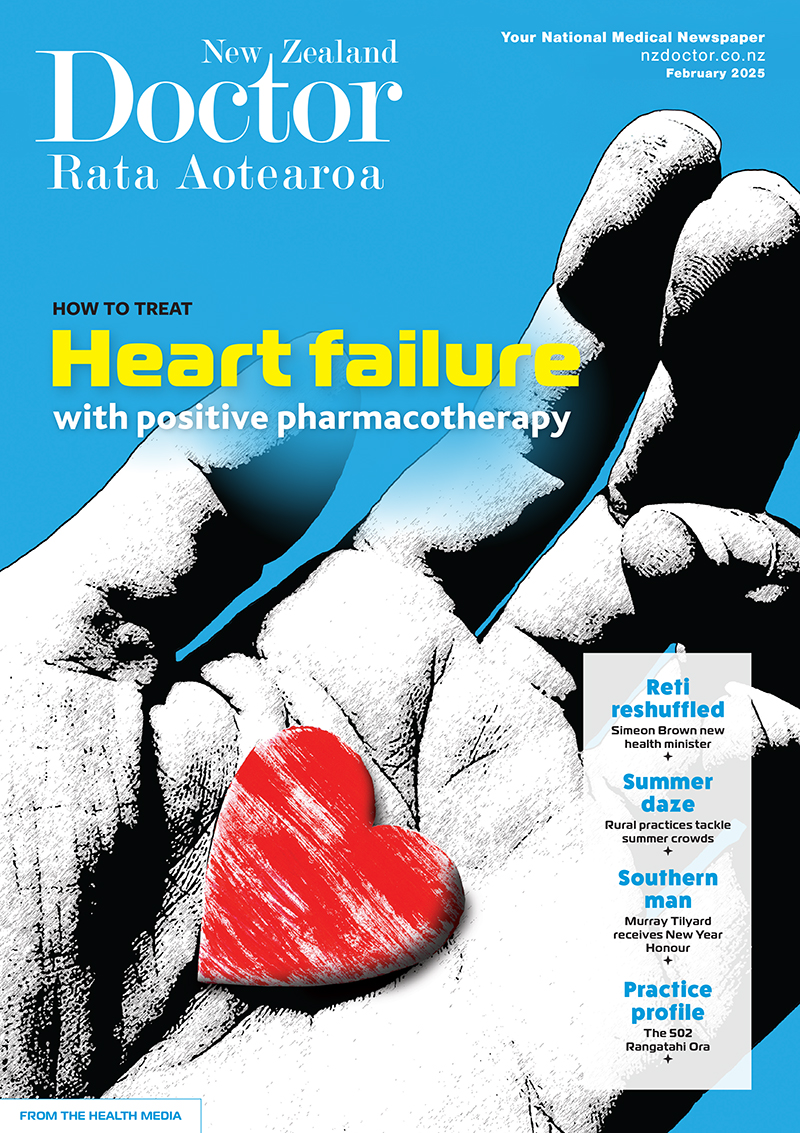Pharmacist prescribers Linda Bryant and Leanne Te Karu discuss positive polypharmacy for heart failure. Current evidence shows the intensive implementation of four medications offers the greatest benefit to most patients with heart failure, with significant reductions in cardiovascular mortality, heart failure hospitalisations and all-cause mortality
Tim Malloy to head National PRIME Committee
Tim Malloy to head National PRIME Committee

Rural GP and Royal New Zealand College of GPs president Dr Tim Malloy has been appointed chairperson of the newly created PRIME National Committee.
Following a year-long review of the Primary Response in Medical Emergency (PRIME) service, one of the key recommendations was to establish a national committee to oversee the service. The New Zealand Rural General Practice Network was tasked with finding an experienced PRIME clinician to chair that committee, said Chief Executive Dalton Kelly.
“I cannot think of a more capable and experienced person than Tim Malloy to be the National PRIME Committee chair. I acknowledge that he is a very, very busy person however his knowledge, experience and clinical expertise makes him perfect for the role. It’s a very, very important piece of work and one of the first tasks will be to review the service’s funding.
“While the issue of funding was not part of the initial review, it has been accepted by the Ministry of Health and ACC that there will be a formal PRIME funding review. This was proposed by the review steering group to address sector concerns that funding is not sustainable.
“Driving the funding review will be one of the national committee’s key work plan priorities,” said Mr Kelly.
Dr Malloy says he applauds the PRIME review process and the establishment of the national committee because it has provided the opportunity to reflect on why PRIME was established, where it’s going, and what has and has not been achieved.
“I was there when we first negotiated the PRIME contract. We knew we were being short-changed and that there were a number of short-comings. We hoped that eventually we would overcome that and we hoped the funding envelope would grow over time as would training and equipment.
“So this is an opportunity to bring my knowledge to this and make some progress. PRIME is work that meets and suits our geography and demographic. There is never going to be a paramedic on every street corner. Rural practitioners need to be equipped to do this.
“This opportunity to chair a committee and to make improvements to PRIME is a unique opportunity. We are the PRIME providers and we have to govern it. I am looking forward to the challenge and the opportunity to do so,” said Dr Malloy.
MORE …
The chair’s term is two years, and may be reappointed if approved by the NZRGPN and National Ambulance Service Office (NASO). The chair is responsible for engagement with key external stakeholders about developments of the PRIME service. In particular, and subject to being invited to do so, the chair will provide regular updates to the National Rural Health Advisory Group (NRHAG).
Other key PRIME review outcomes include providing a safe, effective and sustainable service that allows a balance of local autonomy and central control and is aligned to the themes in the New Zealand Health Strategy 2016: people-powered, closer to home, value and high performance, one team and smart system.
The PRIME service aims to ensure high quality, timely access to pre-hospital emergency treatment in areas where access to appropriate clinical skills are not available, or where ambulance service rural response times may be longer than usual. PRIME is provided by specially trained GPs and Practice Nurses (PRIME practitioners) who assist ambulance services. It is a 24-hour a day, seven-day a week service where PRIME providers are on an on-call roster.
PRIME service responses are initiated by emergency ambulance communications centres.
The PRIME service is funded by the Ministry of Health and ACC, and is administered by St John. Funding is provided for training and delivery of PRIME.
In early 2016, the National Ambulance Sector Office (NASO), on behalf of Accident Compensation Corporation (ACC) and the Ministry of Health, asked for formal feedback on the PRIME service.
The purpose of this feedback was to better understand the issues being raised and to inform the above parties on whether a formal review was required.
A lot of feedback was received from a range of sources, including St John, PRIME practices and practitioners, Primary Health Organisations (PHOs), Rural Service Level Alliance Teams (SLATs), PRIME committees, Emergency Care Coordination Teams (ECCTs), National Rural Health Advisory Group (NRHAG) members and members of the New Zealand Rural General Practice Network (NZRGPN).
In June 2016, NASO decided to proceed with a formal review of PRIME. The review was completed in the first half of 2017.
A steering group was established to oversee the review made up of representatives from NASO, ACC, the Ministry of Health, the NZRGPN, St John, the Royal New Zealand College of General Practitioners and the College of Primary Health Care Nurses.



